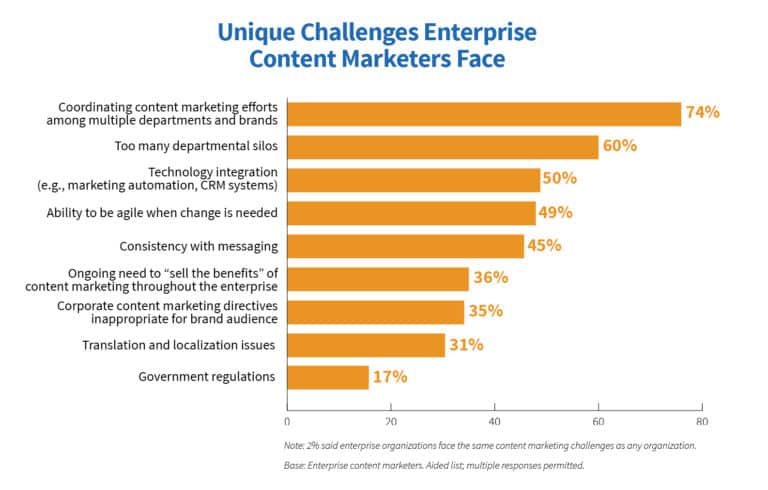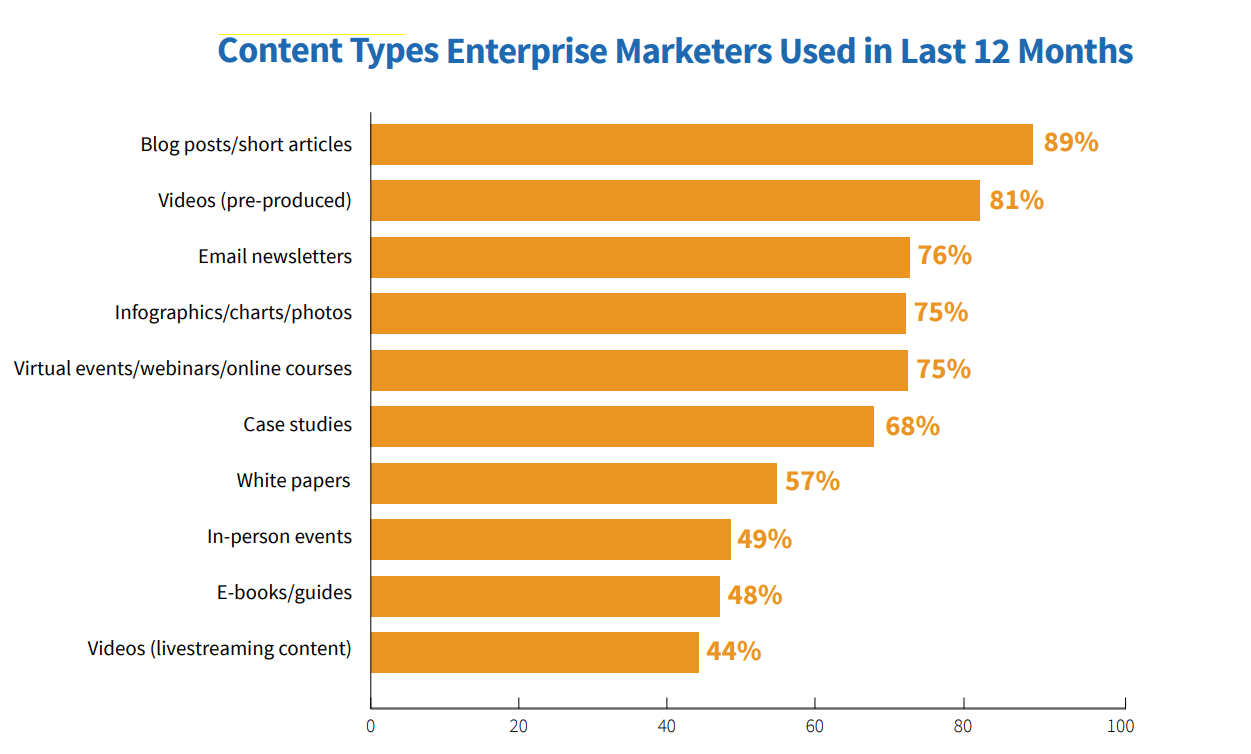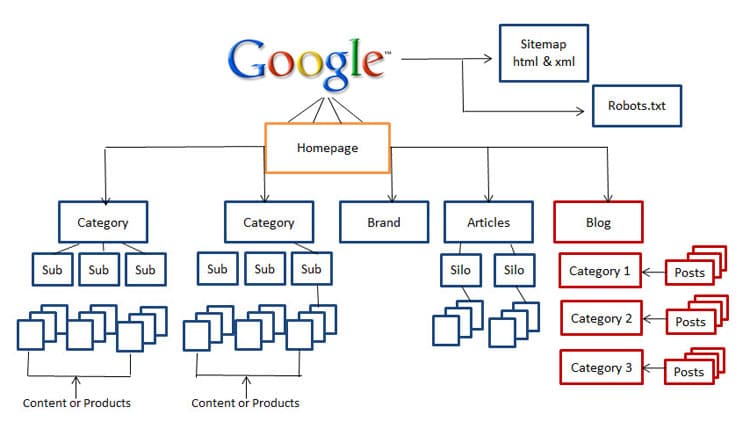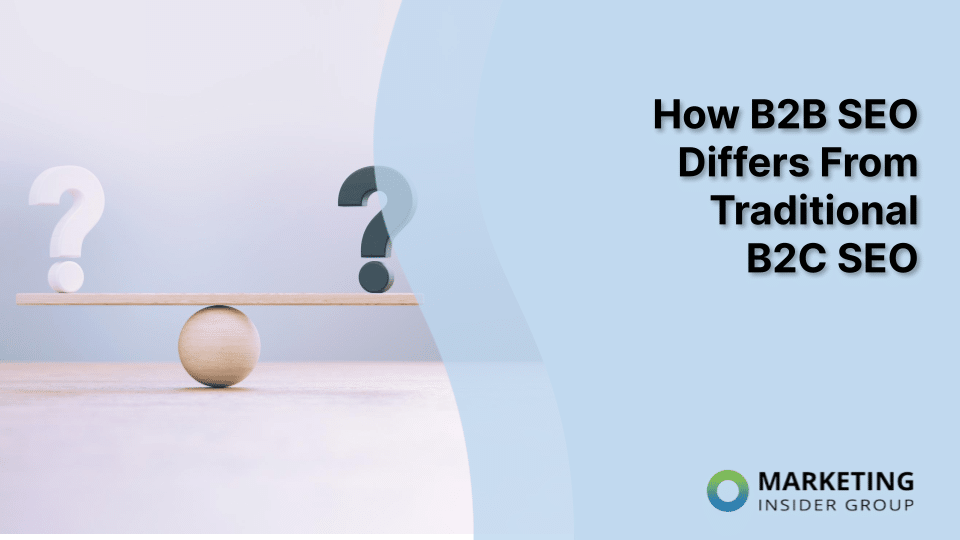
The Content-Driven Guide to Enterprise SEO
Enterprise SEO is finally getting the attention it deserves.
For a long time, the world’s biggest companies kept their ad spends high and stayed somewhat stuck in the Mad-Men era of traditional ad campaigns. Thanks to their already-established huge brand presences, in many cases this continued to work just fine.
For a while, anyway.
There’s no denying that today every brand — no matter how big — needs to get on board with content marketing and, more specifically, a strong enterprise SEO strategy. Google and other search engines have totally democratized brand visibility potential. Large brands can’t expect to easily beat out smaller industry players with bigger budgets and higher brand recognition.
The thing is, these smaller, newer, more entrepreneurial companies? They’re often savvier at the SEO game than large enterprises. When your company is huge, there’s more to coordinate and speed is difficult. It’s easy to fall behind without a focused effort.
In this post, we’ll cover why large companies need to launch a strong enterprise SEO strategy and 10 actionable steps they can take to do it.
Quick Takeaways
- Enterprise SEO is a critical part of managing the high-volume content produced by large companies.
- Content planning and building internal best practices are two key preparatory steps for strong enterprise SEO.
- High-quality, consistently published content produces the best SEO results.
- Link building and striking distance keywords are two “low-hanging fruit” opportunities for large companies to strengthen their enterprise SEO.
- Paying attention to website structure, technical issues, and duplicate or thin content are key to maintaining strong website performance.
- Regular reporting on key KPI metrics can build buy-in for enterprise SEO across your organization.
What is enterprise SEO and why is it important?
Enterprise SEO is the implementation of a comprehensive, large-scale strategy for increasing the organic search presence of an enterprise-level website. Because of the sheer scope of an enterprise SEO strategy, it requires real organizational commitment and leadership as well as an alignment with larger core business goals.
In other words: it’s no small undertaking.
But it is critical to business success for large companies — even those who already have a significant market share — because of the way consumer behavior is changing along with norms for how businesses communicate with their customers.
The internet — search engines specifically — have massively leveled the playing field for brand visibility. No matter how traditionally ahead of its competitors a company may be, without an enterprise SEO strategy it is at risk of being beat out by newer, smaller, or savvier companies for space on search engine results pages (SERPs).
At the core of any SEO strategy, including those at the enterprise level, is high-quality, consistent content. Without strong content, no enterprise SEO strategy will succeed. That’s why our 10-step guide for enterprise SEO is focused on great content first, then key follow-up strategies to keep things fresh, avoid common pitfalls, and maximize performance.
10 steps to a successful enterprise SEO strategy
Create a content plan
Enterprise SEO is a (major) part of an enterprise content strategy. A good content strategy requires a content plan, which is the very first step we recommend to put yourself in the best position to maximize SEO opportunities.
Large enterprises may have resources that smaller companies do not, but they also have their own set of challenges due to their size. Coordination, consistency, agility — these are all factors that are more difficult for large enterprises when it comes to content marketing.
Recent research done by Content Marketing Institute found that 74% of enterprise marketers said coordinating efforts across departments is challenging, and 60% said their organizations have too many departmental silos.

It may be impossible to completely eliminate these issues but taking time to create a strong content plan before implementing any tactics can go a long way in minimizing them. Internal content planning teams should be cross-functional and include representation from many areas in the organization.
While your marketing team should take the lead on creating your execution tactics and timeline, including a wide range of representatives in the ideation phases of planning not only leads to more ideas and a bigger perspective, it creates more buy-in across the organization. This buy-in will be critical later on as you work to keep your website optimized and messaging consistent.
Develop internal SEO best practices
Most people in any enterprise won’t be SEO experts. Yet, they’ll have job responsibilities like website updating, social media, video production, copywriting and more — all that will affect your website’s SEO performance.
For this reason, every enterprise SEO strategy should prioritize internal SEO best practices. This can be done in a number of ways:
- Provide SEO training for all content creators and website updaters
- Develop an SEO guide that’s always accessible
- Create clear processes for content quality control before publication
- Regularly report on content performance
Content, content, and more content
There is pretty much no such thing as too much content when it comes to successful enterprise SEO. The more high-quality content you produce, the more visible your brand will be.
Fortunately, there are many types of content you can create and ways you can incorporate it into your larger strategy. Websites, blogs, videos, social media posts, infographics and podcasts are all examples of content you can create that can contribute to enterprise SEO performance.
Content Marketing Institute reported earlier this year that enterprise marketers regularly used 10 different types of content in the past 12 months, with blog posts (89%) and pre-produced videos (81%) the two most popular.

Remember: SEO rankings don’t emerge overnight. It’s a long game, and it requires commitment and consistency. Produce lots of content and publish it regularly and you’ll see an impact.
Prioritize link building
Link building remains one of the most important Google rankings factors for companies of every size. For enterprise-level organizations, link building presents an even bigger opportunity because they have larger websites and (generally) more established brand authority, making it easier to get other companies to link back to your content on their websites, too.
Internal link building is the easiest tactic and one that should not be overlooked as a contributor to enterprise SEO. Seek out opportunities to link internally throughout your website and blog content. Make sure that your most important and best-performing content is linked frequently in other places on your website.
Creating consistent and valuable content is the surest way to gain external links, and as we said, this is even easier for enterprises with an established brand presence. Other ways to increase external links are to guest blog and partner with influencers in your industry.
Pursue keywords within striking distance
Even easier than starting from scratch to rank new keywords is look at those you rank for, only off the first SERP (which, let’s be honest, is almost as bad as not ranking at all). These are often referred to as striking distance keywords, and they’re like the low hanging fruit of enterprise SEO.
They can also be identified easily with keyword research tools like SEMRush. Here’s how:
Enterprises are likely to have thousands of keywords they’re ranking for due to the size of their websites and existing brand presence. It’s important to continually focus on those with the highest potential (typically those ranking on page two or three) that probably require smaller tweaks and updates to improve their rankings.
Map your keywords
Keyword mapping is a way to ensure the pages on your website are ranking for the right keywords based on user intent.
For example, if a customer makes a general inquiry but is led to pages about specific products, user experience suffers. They’ll have to go searching through your website to find what they need.
Keyword mapping, in summary, requires intentionally grouping keywords by theme or user intent and aligning them with the right pages on your website so that your ranked content has the highest potential to convert leads.
Conduct regular content audits
Enterprise SEO (and any other part of your content strategy) is never a one-and-done deal. Regular content audits help you see which content is performing best, identify opportunities for improvement, and spot problems early.
Content audits are also important because SEO tactics and ranking factors evolve and change. Audits help you keep your content fresh and ensure even your best content doesn’t fall off its rankings.
The practice is even more critical for enterprises because of the volume of content they publish. One broken link, when linked internally at a high frequency, could have impactful consequences on your website’s performance. It’s better to be proactive with audits than be stuck playing catch up after your content performance suffers.
Optimize website structure
Having all website pages indexed plays a huge role in determining your rankings. Google and other search engines are constantly crawling the web and indexing sites for better SERP accuracy.

In general, web pages fail to be indexed by search engines when site structure is poor, or the website has many technical issues.
Get your enterprise’s web development and IT teams on board with your SEO strategy and work with them in an ongoing way. Similar to performing content audits, proactively monitoring your website for problems is a way to mitigate risk and identify issues earlier to avoid performance issues.
Working it into your standard processes by creating a partnership with web and IT teams also creates a better organization-wide understanding of SEO and its importance.
Eliminate duplicate and thin content
Larger websites are more likely to have duplicate or thin content. Duplicate content is just how it sounds: the same content in multiple places on your website. Thin pages are those with very little content or that don’t bring high value to your users.
The problem with this content is not that it’s inaccurate, but that it confuses search engines about which content is most important. Eliminating content that you don’t need ensures that the pages your users find on SERPs will deliver value.
Measure goal driven KPIs
Last but definitely not least is to make KPI measurement a regular part of your strategy. There are a few reasons this is important. First, it tells you whether or not your strategy is working. Without measuring results, your enterprise SEO strategy is basically a shot in the dark. Regular reporting on key metrics increases accountability and enables you to make adjustments as needed to keep your content optimized.
Second, it demonstrates to executives and others at your company how SEO makes an impact on content and website performance. This builds buy-in across the organization and helps increase the effectiveness of your strategy over time.
Boost your enterprise SEO strategy with great content
Did you know that Marketing Insider Group has a team of writers and SEO experts that can deliver you optimized, ready-to-publish content every week for a year? Our Content Builder Services also include a complete content audit and customized editorial plan.
Contact us today to schedule a quick consultation and learn more about how we can help you jumpstart your content strategy!






